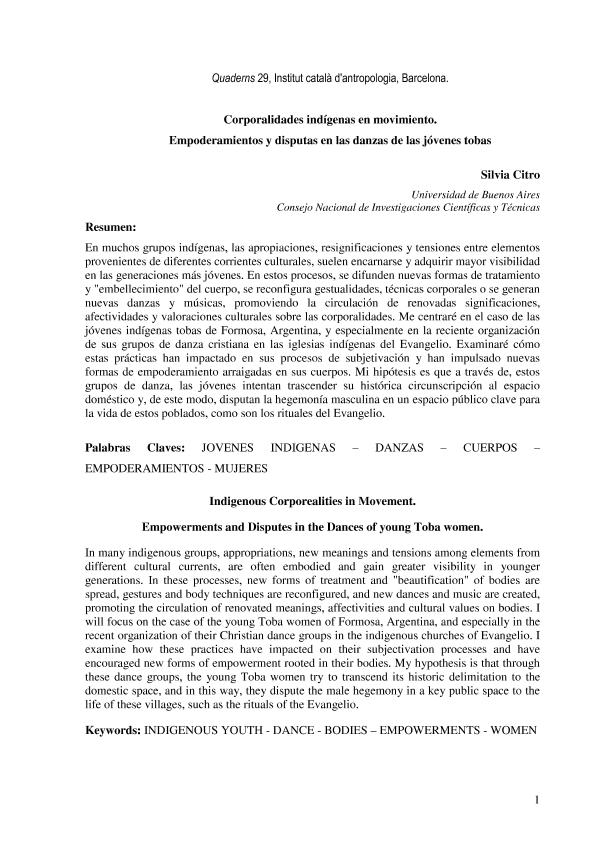Mostrar el registro sencillo del ítem
dc.contributor.author
Citro, Silvia Viviana

dc.date.available
2016-12-07T21:14:19Z
dc.date.issued
2013-01
dc.identifier.citation
Citro, Silvia Viviana; Corporalidades indígenas en movimiento. Empoderamientos y disputas en las danzas de las jóvenes tobas; Collegi d'arquitectes de Catalunya; Quaderns; 29; 1-2013; 131-152
dc.identifier.issn
1138-5790
dc.identifier.uri
http://hdl.handle.net/11336/9046
dc.description.abstract
In many indigenous groups, appropriations, new meanings and tensions among elements from different cultural currents, are often embodied and gain greater visibility in younger generations, bringing new images and uses of bodies. Thus, new forms of treatment and "beautification" of bodies are spread, gestures and body techniques are reconfigured, and new dances and music are created, promoting the circulation of renovated meanings, affectivities and cultural values on bodies. I will focus on the case of the young Toba women of Formosa, Argentina, showing how some of these changes have impacted on their subjectivation processes, promoting new forms of empowerment rooted in their bodies. My hypothesis is that through the recent organization of Christian dance groups, these young women try to transcend its historic delimitation to the domestic space, disputing the male hegemony in a central public space to the life of these villages, such as rituals of indigenous churches of Evangelio.
dc.description.abstract
In many indigenous groups, appropriations, new meanings and tensions among elements from different cultural currents, are often embodied and gain greater visibility in the youth. In these processes, new forms of treatment of bodies are spread, gestures and body techniques are reconfigured, and new dances and music are created, promoting the circulation of renovated meanings, affectivities and values. I will focus on the young Toba women of Formosa, Argentina, especially in the recent organization of their Christian dance groups in the churches of Evangelio. I examine how these practices have impacted on their subjectivation processes, encouraging new forms of empowerment rooted in their bodies. My hypothesis is that through these dance groups, the young Toba women transcend its historic delimitation to the domestic space, and in this way, they dispute the male hegemony in a key public space such as the rituals of the Evangelio.
dc.format
application/pdf
dc.language.iso
spa
dc.publisher
Collegi d'arquitectes de Catalunya
dc.rights
info:eu-repo/semantics/openAccess
dc.rights.uri
https://creativecommons.org/licenses/by-nc-sa/2.5/ar/
dc.subject
Jovenes Indigenas
dc.subject
Danzas
dc.subject
Cuerpos
dc.subject
Empoderamientos
dc.subject.classification
Otras Ciencias Sociales

dc.subject.classification
Otras Ciencias Sociales

dc.subject.classification
CIENCIAS SOCIALES

dc.subject.classification
Otras Ciencias Sociales

dc.subject.classification
Otras Ciencias Sociales

dc.subject.classification
CIENCIAS SOCIALES

dc.title
Corporalidades indígenas en movimiento. Empoderamientos y disputas en las danzas de las jóvenes tobas
dc.title
Indigenous Corporealities in Movement. Empowerments and Disputes in the Dances of young Toba women.
dc.type
info:eu-repo/semantics/article
dc.type
info:ar-repo/semantics/artículo
dc.type
info:eu-repo/semantics/publishedVersion
dc.date.updated
2016-11-24T17:22:56Z
dc.journal.volume
29
dc.journal.pagination
131-152
dc.journal.pais
España

dc.journal.ciudad
Barcelona
dc.description.fil
Fil: Citro, Silvia Viviana. Universidad de Buenos Aires; Argentina. Consejo Nacional de Investigaciones Científicas y Técnicas; Argentina
dc.journal.title
Quaderns

dc.relation.alternativeid
info:eu-repo/semantics/altIdentifier/url/http://www.raco.cat/index.php/QuadernsICA/article/view/280188
Archivos asociados
